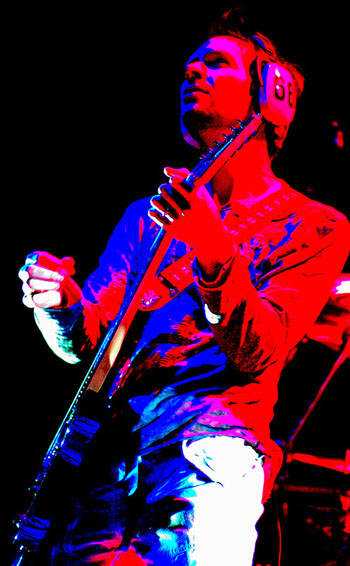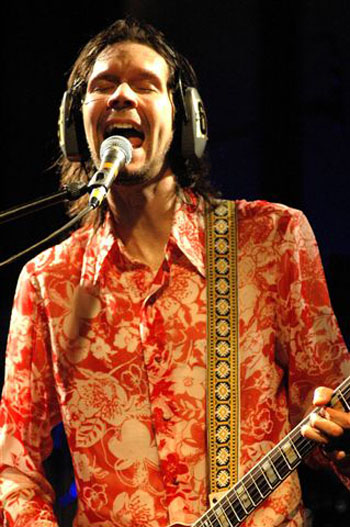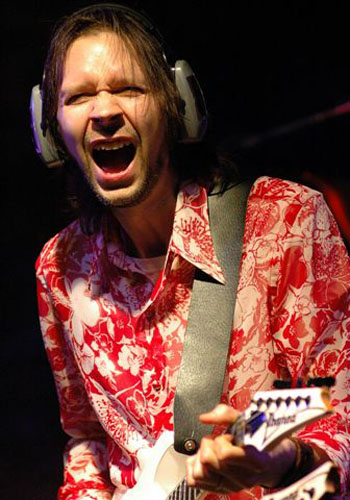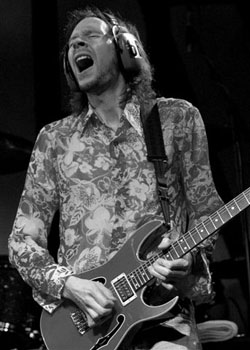
|
||
|
| Interview: PAUL GILBERT |
Photos by Lee Millward/GRTR!
From graduating from the Guitar Institute of Technology and becoming one of their youngest instructors to pursuing a career as a supreme guitar shredder in the Heavy Metal and Speed Metal genres to playing chart topping melodic hard rock and complex instrumental music, Paul Gilbert is not a guitarist to rest on his laurels. Aside from penning his own columns in leading guitar magazines his playing career has so far included the would be super group Racer X, the commercially successful and MTV friendly Mr. Big and the successful launching of his own solo career that has latterly veered towards two instrumental albums.
On top of
that last year Paul toured as part of the sell out G3 tour in
the company of company of fellow guitar instrumentalists Joe
Satriani and John Petrucci, further evidence that he continues
to follow whatever path it takes to bring new expression to his
form of rock music.
In fact
the Jimmy Page style violin bow ended up being the solution. And
that's a lot of fun live both visually and sonically. Back in the 70's when I was growing up and listening to music, bands were the only way you could make music. I had no concept of multi tracking or over dubbing. I just thought you might get the opportunity to play and that would be the sound. It's funny the way technology has changed. You know people can really make a record in their bedroom and they do! But it's a whole new process. For me as a teenager I was always searching for human beings - like where I could find a good drummer, a good vocalist or bass player? etc.
For
someone who once professed to be bored by instrumental music,
you seem to have suddenly embraced it as you are already on your
second album. How did you get to that point? They were also just as much fun to play, so that worked me up to the idea of a whole record of it. Also a lot of people had asked about it and I thought it would be an interesting challenge, especially as in my role as a listener of music I'm not a big fan of instrumental music. So I thought my standards for my own instrumental records are going to be not necessarily higher than anyone else's but certainly different. And what I'm going to want out of it might even be different from what my fans want. Really want I want is for it to rock. I don't want it want it to be just a record for a guitar player but a record that any rock fan can listen to. And so as inspiration I started to think about what existing instrumental things do I like? And I realised that much as I'd come to appreciate Joe Satriani for example, I didn't go to him for inspiration. Initially I went to my old Rush albums, XYZ or I'd got to old Van Halen records that weren't instrumental records as such but would have really cool instrumental breaks. You know the guitar solo section would not just be strict guitar solos, but the bass and drums would be doing cool stuff too.
So that
was sort of my starting point and after doing the G3 shows and
through osmosis and picking up on some of what Joe was doing
that expanded it even more for me. He certainly is a master of
the art and hopefully I will keep expanding it from there Actually I was doing a co-interview with Joe once - we were both being interviewed at the sale time - and I started to interview him, asking 'How, when you write how do you do it, is there some kind of formula'? And he said no, not at all. I was really surprised by his answer as he is the master of the art, he's probably figured out some formula by now. And to find out from him that there wasn't a formula was kind of liberating to me. So I thought OK there doesn't have to be one, its OK to not have these rules and approach it song by song.
The
album is both complex and but rocks and delivers more through
repeated plays. Are you aware of that?
I couldn't
take it all in after one listening. It wasn't like a blues band
kind of album or even a Van Halen album or even Mahogany Rush
and Frank Marino. But I found after a week of playing it, the
Rush album would be my favourite. It was like the pay off for
investing your time in it. With any kind of complex music I
suppose that's the test you have to pass as a listener.
In out
Racer X days in the 80's we had to hire a separate hair person.
We all had crazy spandex and it was a lot of work getting it
together, though it was a lot of fun actually. But because I
fancied myself as a serious musician I preferred to put my time
into the creative music, than to have to put so much work into
the visual side of things. You know if you look at the photos on
the new record, I'm unshaved and a mess, but hopefully an
interesting mess! Whereas Mike was more, no, do more guitar solos, faster guitar solos, that sort of coaching us to be as extreme as possible. But I didn't mind you know, I was a teenage kid. Faster? Oh, OK that's crazy but crazy is good. Actually Racer X was one of the few Shrapnel bands that had a singer. Most of them were like Vinnie More, Tony McAlpine or pure instrumentalists. To me that was a little too niche, I always wanted to be in a band and I was really hesitant to join the instrumental world. But when I finally did join that world I found that the niche had been round long enough where it had grown to the point where it was significant. And it blew my mind during G3 tour of the States last year that the audiences were so great, and also the gigs with Joe in the UK, all the shows are sold out. The really great thing is the age range of the audiences, people older than me and kids too. I would never have predicted that. In fact I would have been the worst record company guy in the world as I wouldn't have any idea of predicting what people want.
How did
you hook up with Joe then?
If on the
other hand you use just one sound and one texture, then the
whole album becomes boring, especially if you give the listener
the same distorted guitar sound for 40 or 50 minutes, that's
cruel.
And these
are the key guitars lines, the ones I'm going to stay with, and
then I'd let Jeff and Mike listen to them for a couple of weeks
and they'll build their parts and the details of their parts.
And so far working that way has been great. It sounds like we
worked out a lot of stuff and in the end you try and do it live
in the studio, especially before we go on tour and stuff. Then
what happens is a lot of magic is created that way.
And that resonated with me, 'cos even though I'm a rock and roller if I follow my peers I should be drinking too much and punishing myself physically with chemicals, to me in the long run that's not for me. I've always been more focussed on music and trying to stay as healthy as I can be on the road. (laughs)
When
you came to the material for this album did you pay particular
attention to sequencing as part of a bigger picture?
I remember
'Lean Into It' by Mr. Big, that was so obvious where to put
things and that was one of our best records. And even with this
album where some of the music is arguably more progressive,
there's still a flow and it seemed pretty obvious where to put
things.
And I
always wanted to play it on guitar and finally I found a guitar
with a sustainer in it to make it sound like a flute; With a
regular guitar you wouldn't have that flowing big breathy kind
of flute sound.
My initial
thought was I want to stay away from melodies, 'cos melodies are
for singers and I thought riffs and fast bluesy licks are for
guitar players and I was very opinionated and stubborn in my
divisions. Then intuitively I started writing melodies, and I
thought well I like it, I guess I'll keep that one and the more
I wrote the more melodies kept coming out. And finally I took my
barriers down and threw my stubbornness away and followed my
instincts that are what came out.
Interview © May
2008 Pete Feenstra
Photos by Lee Millward/GRTR!
|
|
get ready to rock is a division of hotdigitsnewmedia group





